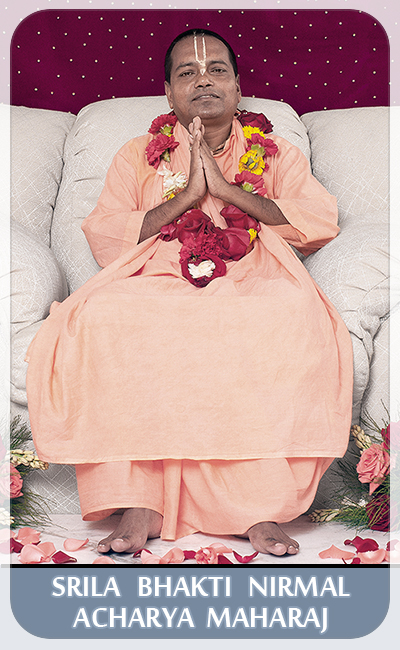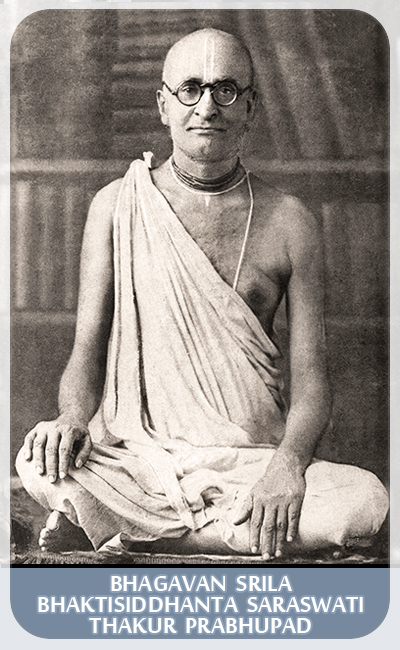Our Disciplic Succession:



|
"The Sun Never Sets on Sri Chaitanya Saraswat Math":
|
| ABOUT US | GUIDANCE | LIBRARY | DAILY PRACTICE | PHOTO | CALENDAR | CONTACT |
(16/18) Vaishnavs' Ornaments vs Demons' Ornaments
His Divine Grace Om Vishnupad
Srila Bhakti Nirmal Acharya Maharaj
Sri Vyasa-Puja Adhivas, Tarakeswar,
Evening, 28 September 2019, part 16
Translated from Bengali
I told you earlier today about the 'trnad api sunichena' sloka ('be humbler than a blade of grass'). What does sunichena (humble) mean? It means not wanting any respect or honour for yourself. Not wanting honour for yourself and giving honour to others is called sunichena, humility.
Considering yourself honour-less (a-mani, wanting no honour for yourself), but giving honour to others (mana-dena) is called lowliness (su-nichata). Humility is the Vaishnav's ornament, garb and embellishment. Humility brings beauty to the Vaishnav. The beauty or attire of a Vaishnav is humility. Sri Sri Gaurasundar loves such humility a lot; He swooned seeing the humility of Srila Haridas Thakur and Srila Sanatan Goswami.
Everybody wanted Srila Haridas Thakur to sit and take prasad together with everybody, 'Please come and sit, take prasad with everybody.' But Srila Haridas Thakur refused, 'I have no right to sit here. Let the Vaishnavs take prasad first, and I will take it later.'
Sri Sri Gaurasundar wanted to embrace Sri Sanatan Goswami, but Sri Sanatan Goswami considered himself a yavan, untouchable, low-caste, and wanted to keep away – he was born into a Karnata brahman family, he was a great scholar, but how much humility he has! 'I am untouchable, I do not have a drop of love for You, I have no service mood!' – such humility is an ornament of a Vaishnav. Consequently, those who have no humility have no Vaishnav qualities.
Many people like to say, 'Oh, I am doing great service. But for me, it would not have been done.' This is pride, ego; this is not Vaishnavism. One can do so much service, but they still consider themselves lowly, 'I am a poor beggar, I have not been able to do anything. No matter what I do, it is always deficient.' Such mood is an ornament of a Vaishnav. This feeling of being poor is their beauty. The poorer the Vaishnav is, the more they are able to attract the mercy of Sri Gurudev and Sri Haridev (the Supreme Lord).
However, some come forward and want to be first – this is transgression of etiquette – they have no right to stand or sit ahead of everyone. This is arrogance and transgression of etiquette. 'Maryada-langhana ami na paro sahite. I cannot tolerate transgressions of the common etiquette' (Sri Chaitanya-charitamrita, 3.4.166). These are Mahaprabhu's words. Transgression of etiquette means running to take prasad first, running to walk first during the parikrama, and so on. Always wanting to be first, to be ahead of others – this is pride, arrogance and transgression. Mahaprabhu says that He cannot tolerate such behaviour. Those who have humility can develop tolerance – in other words, the quality of tolerance and patience gradually comes to those who are humble. Those who have no humility cannot give proper honour to others, cannot treat others properly. If you cut a tree or strike it with a spade, it does not say anything. This is called tolerance. Such tolerance comes from humility.
We must practise properly what our guru tells us. The realisation of the meaning of gurudev's words comes to one's heart through kirtan. You must preach what your guru says. It is not possible to practise devotion in seclusion. You think, 'I will stay on my own. I will cook my own food, I will study books on my own, and I will chant kirtans on my own.' It is impossible to practise like this in Kali-yuga. In Kali-yuga, if you try to live like this, you will only become very proud and lazy – such a secluded live creates only bad things. If you think that you can practise and get something by staying away from everybody and practising on your own, it is a wrong idea. Kirtan means you must tell others what your guru teaches.
If you want to practise spiritual life at a temple, you must pay attention to sravan, kirtan and archan. And even if you live as householders, you must also be always alert if you are practising sravan, kirtan and archan.
What are the obstacles in devotional life? A lack of faith (asraddha), crookedness (kautilya) and material attachment (visaya-asakti). Faithlessness can be of two types: not believing and doubting, or being suspicious. If somebody has no faith in their heart, even if you tell them about the Lord or devotion to the Lord, they cannot accept it readily. The cause is ignorance. Those who have never heard about the Lord are ignorant. Such people have a very bad mood. Faithlessness is a very bad quality. When faithless people hear about the supramundane glories of the Lord and the astounding quality of devotion, despite the inconvenivable glory of all these things, they dismiss it as something superficial or of no consequence. This here is a holy temple where the holy Lord Himself resides, but even knowing it, they treat the temple as an ordinary building and show all kinds of disrespect and hatred.
These are actually not my words, these are Srila Prabhupad's words. And what Srila Guru Maharaj said is even harsher. It is said that whatever offenders and atheists there were in Nadia were all washed away in the flood of divine love for God (in the flood created by the river of congregational chanting of Lord Krishna's Holy Names). All those atheists and haters fled far away from Nabadwip, but does it mean that they never came back? In Kali-yuga, they all come back in disguise of sadhus. They put on tilaks, they wear neckbeads, they chant the Holy Name, they dress as sadhus, but they behave like demons. They will stay among sadhus, and when people look at them, they will be bewildered, 'Oh, they look absolutely the same.' People have no eyes, so they will not be able to discern who is a sadhu and who is a demon. Both will look the same, but the way they behave will differ. Guru Maharaj said that sadhus' mood is now changing and going in a different way...
The Lord has created it like this to test His devotees. He wants to see how much pain His devotees can tolerate. Washing, scrubbing and polishing His devotees, the Lord will take them to Himself, but before that He wants to see how much they can tolerate. Those who cannot tolerate stray from the path of devotion. Gurudev gives you a ticket to Vrindavan, but if you get on the train and then suddenly get off at some other station on the way, you will not get to Vrindavan. You think, 'Oh, this must be Vrindavan already!' and you get off. This is how you never end up getting to Vrindavan. It is very difficult to move forward in spiritual life, but it is very easy to fall down from it...
— : • : —
| ◄ | ► |
{ 2001 |
2002 |
2003 |
2005 |
2009 |
2010 |
2011 |
2012 }
{ 2013 |
2014 |
2015 |
2016 |
2017 |
2018 |
2019 |
2020 |
2021 }
CLICK TO LISTEN TO THE LECTURE
Size: 40 Mb
Length: 83 min
Language: Bengali
READ OTHER PARTS:
1)
Disciple's Dependence
2)
How Does Devotion
Come?
3)
Indispensability of
Guru's Mercy
4)
Stop Threshing the
Husk
5)
Disciples' Hypocrisy
6)
Strong Desires, Wrong
Desires
7)
Identifying Yourself
with Kirtan
8)
Patience Is a Virtue
9)
Internal Hypocrisy
10)
Unhappy Mind
11)
Kirtan Is Not a Show
12)
Cook to Perfection
13)
Install Gurudev in Your
Heart
14)
Submission without
Resistance
15)
Service Is Not a Rite
16)
Vaishnavs' Ornaments vs Demons' Ornaments
17)
Vaikuntha Vani
18)
Absolute
Self-Submission
| Niskam Bhakti: With Heart and Soul |
|---|
| 'Do not show false renunciation, devotion must be in the heart. Love with heart and soul—serve heart and soul. If you show you are doing some service, but in your mind you are asking for something else from the Lord, from your Guru, it is not niskam bhakti.' |
 |
“If
you take initiation, it does not mean there is a relation—a heart to
heart connection is necessary.” |
 |
Sitemap | Contact us | About us
